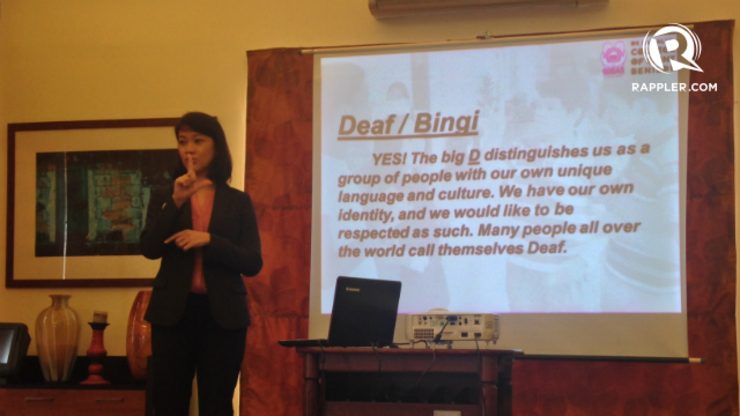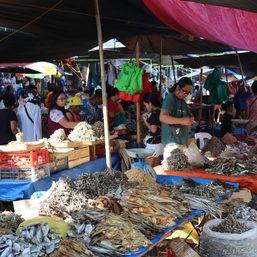SUMMARY
This is AI generated summarization, which may have errors. For context, always refer to the full article.

MANILA, Philippines – “Say it with me: Deaf. Bingi. Who’s not comfortable with it?”
Nicky Perez, dean of the De La Salle-College of St Benilde’s School of Deaf Education and Applied Studies (SDEAS), asked members of the media on Tuesday, November 11.
No one raised their hands – a good sign for Perez.
“When we started out with our deaf advocacy and our deaf awareness, I would see people cringe when I would say Deaf, in the same way that I would cringe when they would say hearing-impaired,” she said.
But why use the former over the latter?
Perez explained: “Why do I use Deaf? Why do I use bingi? Kasi sabi nila, sabi ng mga bingi, sabi ng mga Deaf (because the deaf said so), that’s what they want to be called. Who am I to impose the supposedly politically correct terms on them? That’s who they are, that’s their identity.”
Notice the use of the capital letter. For the Deaf, even the use of letter cases matter.
Former President Corazon Aquino signed Proclamation 829 in 1991, declaring November 10 to 16 of every year as Deaf Awareness Week. (READ: Living without sound in two worlds)
On Tuesday, SDEAS’ Ana Kristina Arce, who also graduated from the school, explained to the media the different names they are called, and which ones they deem acceptable.
| NOT ACCEPTABLE | ACCEPTABLE |
| Deaf-and-Dumb – We may not be able to hear, but it does not mean we are stupid. | deaf – This is OK, when talking about people with hearing loss, in general. |
| Deaf-Mute – We use various means to communicate – some use their voice while others use sign language. Because we cannot hear how loud or soft or how high or low our voices are, we are sometimes ridiculed and we feel terrible. Would you want to be laughed at? Neither do we. | Hard of Hearing – Some of us can hear quite a bit. We, hard-of-hearing people, live in both the hearing world and Deaf world – we have an identity of our own. |
| Pipi – Tagalog version of mute. Not true. Maaring magsalita ang marami sa amin kung nais namin. | Deaf/Bingi – YES! The big D distinguishes us as a group of people with our own unique language and culture. We have our own identity, and we would like to be respected as such. Many people all over the world call themselves Deaf. |
| Hearing-Impaired – Why focus on the negative? This term is used mostly by people who are mainly interested in our ears “not working.” | Source: SDEAS |
Two bills for the Deaf are currently pending in the Senate. Senate Bill (SB) 2117 seeks to require local news programs to use Filipino sign language insets.
Meanwhile, SB 2118 wants to declare Filipino sign language as the national sign language of the Filipino Deaf and the official language of government in all transactions involving the Deaf. It also seeks to mandate the use of the language in schools, workplaces, and in broadcast media.
Both bills were introduced by Senator Bam Aquino. (READ: Communicating change: A deaf young leader’s experience)
Mackie Calbay, a coordinator of SDEAS’ Deaf Advocacy Program, urged the media to use the names acceptable to the Deaf when reporting. These are names that highlight the positive outlook of Deaf people toward their selves and the Deaf community.
“It’s our abilities that matter and not our disability,” Calbay said using sign language. – Rappler.com
Add a comment
How does this make you feel?


![[In This Economy] Can the PH become an upper-middle income country within this lifetime?](https://www.rappler.com/tachyon/2024/04/tl-ph-upper-income-country-04052024.jpg?resize=257%2C257&crop=295px%2C0px%2C720px%2C720px)


There are no comments yet. Add your comment to start the conversation.